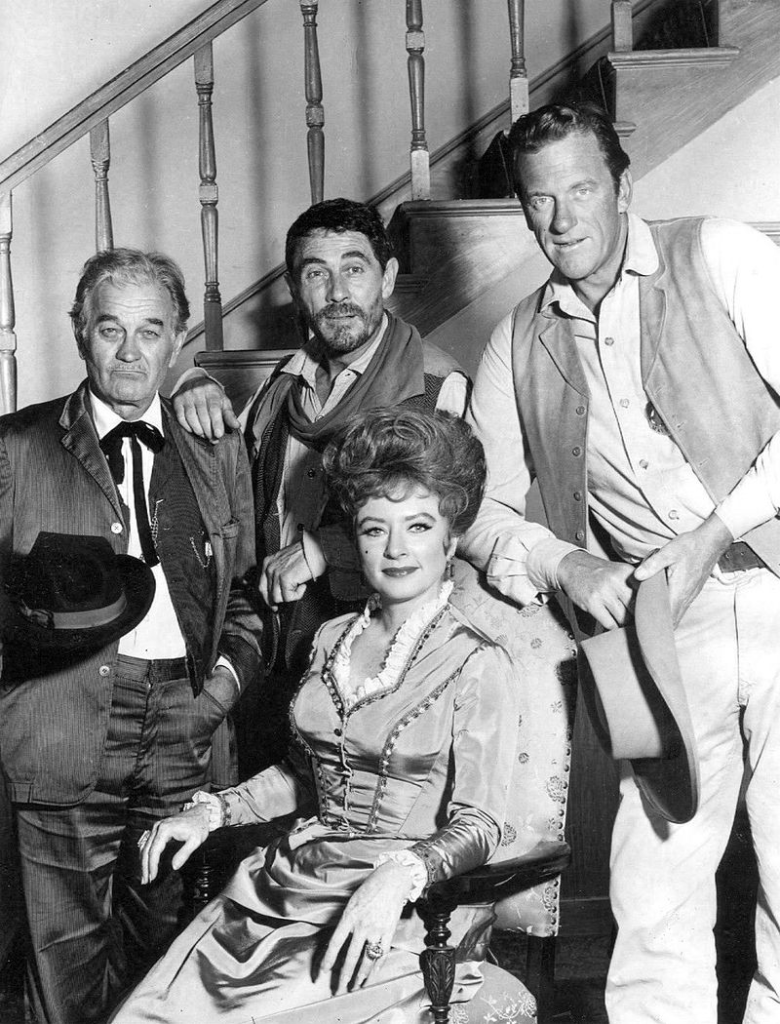
by James Como
Who, of course, is the great Amanda Blake, of Gunsmoke fame. But first . . .
The Fifties have been fixed in amber, it seems, where, critics say, the decade belongs: bland, bigoted, conservative. The Life of Riley, Our Miss Brooks, Ozzie and Harriet, Father Knows Best, The Legend of Wyatt Earp (no one was ever killed), Leave It to Beaver. Men at ballparks in suits, ties and hats. Women in gloves. Mamie Eisenhower. Could life be more stupidly happy, not to say vanilla white?
That is the benign side. Meanwhile, real life was lived on the dark side. The Korean War; Joseph McCarthy, Alger Hiss and the Red Scare; ducking under desks to practice for the imminent nuclear war; The Wild One, Rebel Without a Cause, The Naked City, Blackboard Jungle; sex, drugs, rock and roll. Elvis.
The entire mélange was (the official story tells us) a place-holder for the Real Thing, ushered in by JFK’s Camelot. You can find it all in Eric Goldman’s The Crucial Decade, used as a textbook by one of my professors in a History of American Public Address class. He had been on the speech-writing team of Adlai Stevenson and believed every word.
What Goldman did not tell us, perhaps did not know, was that the Fifties were being undermined, not by juvenile delinquents or Commies or Orville Faubus or the Civil Rights Movement, but by snippets of popular culture, now utterly unacknowledged. Even, at the time, unrecognized.
Several episodes of Bonanza dealt with the Victim, usually an Indian, or with some prejudice against the handicapped. The Rifleman taught us to tolerate Japanese customs, and the deaf, and gauchos, and women in pants. Mostly, though, it was Have Gun Will Travel, under the tutelage of the great Paladin, overseen by Richard Boone, the star, that preached tolerance and the danger of unexamined ethnic, racial, or status stereotypes. It all made for good drama, too: never too preachy (well, maybe Bonanza), merely revealing.
And then there was Kitty Russell, single woman owner of – of all things – the Long Branch Saloon. She was marshal Matt Dillon’s girl, as everyone knew; even I as a child (the show ran from 1955-1975) knew that. Or was she? They never married. He always deferred to her, never coerced, or even persuaded; he barely even suggested this or that choice of behavior.
Once he showed his disappointment. While he was away, she distracted her would-be tormentor and Matt’s killer by playing poker, winning of course. Matt, returning, was clueless. “Kitty, you promised you’d never play again.” Miss Kitty, apparently, had a past. She said something like, “Matt, I just couldn’t help myself.”
Lest the reader get the wrong idea: as a youth, an adolescent, a young man, in my maturity, and now in my dotage, I’ve never had a crush on Amanda Blake. I cannot explain this. (One viewing of Hedy Lamarr in Samson and Delilah and I was undone.) This surprises me; she was very pretty, even beautiful, and at times overwhelmingly alluring. And, man, could she act.
Many whole episodes show her as tender (for example, towards a distressed young girl), or frontier tough (as when she must survive on the prairie), or beaten badly by a terrifying, vengeful sadist – but not broken. Sure, she has been rescued by Matt – but who hadn’t been rescued by Matt, the John Wayne of television?[1] In fact, Matt often expresses his puzzlement at Kitty’s ferocious independence; not only does he defer to it but seems downright chary of it.
Which gets me to my point. Right there, in the benighted Fifties, and Sixties, and the Seventies, was a feminine feminist prototype who not only walked her own path but made one (at least on television) when there wasn’t any.[2] Her own admirable woman. She would have had nothing to do with Me Too: no one would have gotten away with anything in the first place, not even the towering Matt Dillon. And all that without sacrificing that allure.
If anyone deserved a spin-off it was Miss Kitty. Amanda Blake owned it.
[1] Wayne was offered the role but turned it down, recommending James Arness, who fit from the beginning. A propos of nothing, few things get my goat more than the accusation that Wayne couldn’t act (“he always played himself”) or that he was a bigot. The Indian Scar in The Searchers is a kidnapper, murderer and sadist: he deserved being hunted down. But Wayne is a subject, as he was a brand, unto himself and deserves his own meditation.
[2] Along with Milburne Stone as Doc and Arness, Blake is the only actor to last the whole run. Could another actress have matched her? Well, Susan Hayward, probably: an Oscar winner. Ida Lupino? Too diminutive, and, truth be told, if Miss Kitty let down that torrent of red hair she could smolder with the hottest of them, including Mount Ida.
- Like
- Digg
- Del
- Tumblr
- VKontakte
- Buffer
- Love This
- Odnoklassniki
- Meneame
- Blogger
- Amazon
- Yahoo Mail
- Gmail
- AOL
- Newsvine
- HackerNews
- Evernote
- MySpace
- Mail.ru
- Viadeo
- Line
- Comments
- Yummly
- SMS
- Viber
- Telegram
- Subscribe
- Skype
- Facebook Messenger
- Kakao
- LiveJournal
- Yammer
- Edgar
- Fintel
- Mix
- Instapaper
- Copy Link









